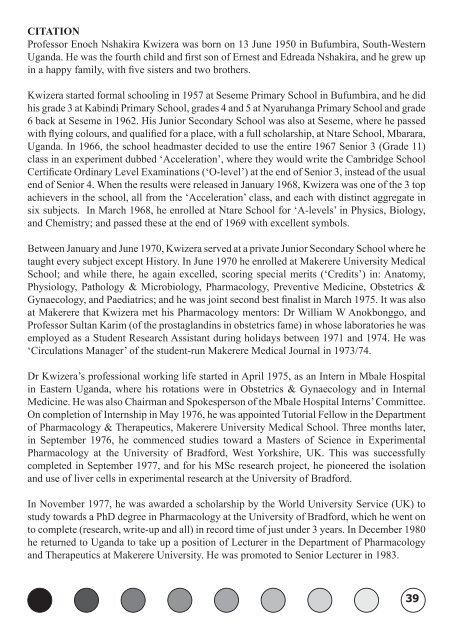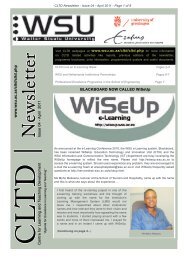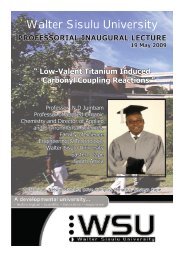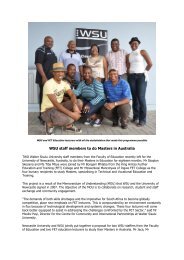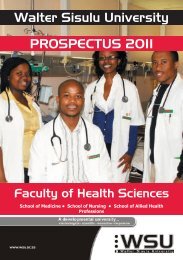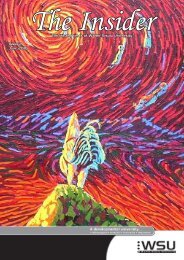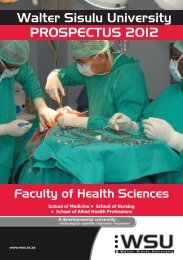25 years of training doctors at WSU: how - Walter Sisulu University
25 years of training doctors at WSU: how - Walter Sisulu University
25 years of training doctors at WSU: how - Walter Sisulu University
Create successful ePaper yourself
Turn your PDF publications into a flip-book with our unique Google optimized e-Paper software.
CITaTIOn<br />
Pr<strong>of</strong>essor Enoch Nshakira Kwizera was born on 13 June 1950 in Bufumbira, South-Western<br />
Uganda. He was the fourth child and first son <strong>of</strong> Ernest and Edreada Nshakira, and he grew up<br />
in a happy family, with five sisters and two brothers.<br />
Kwizera started formal schooling in 1957 <strong>at</strong> Seseme Primary School in Bufumbira, and he did<br />
his grade 3 <strong>at</strong> Kabindi Primary School, grades 4 and 5 <strong>at</strong> Nyaruhanga Primary School and grade<br />
6 back <strong>at</strong> Seseme in 1962. His Junior Secondary School was also <strong>at</strong> Seseme, where he passed<br />
with flying colours, and qualified for a place, with a full scholarship, <strong>at</strong> Ntare School, Mbarara,<br />
Uganda. In 1966, the school headmaster decided to use the entire 1967 Senior 3 (Grade 11)<br />
class in an experiment dubbed ‘Acceler<strong>at</strong>ion’, where they would write the Cambridge School<br />
Certific<strong>at</strong>e Ordinary Level Examin<strong>at</strong>ions (‘O-level’) <strong>at</strong> the end <strong>of</strong> Senior 3, instead <strong>of</strong> the usual<br />
end <strong>of</strong> Senior 4. When the results were released in January 1968, Kwizera was one <strong>of</strong> the 3 top<br />
achievers in the school, all from the ‘Acceler<strong>at</strong>ion’ class, and each with distinct aggreg<strong>at</strong>e in<br />
six subjects. In March 1968, he enrolled <strong>at</strong> Ntare School for ‘A-levels’ in Physics, Biology,<br />
and Chemistry; and passed these <strong>at</strong> the end <strong>of</strong> 1969 with excellent symbols.<br />
Between January and June 1970, Kwizera served <strong>at</strong> a priv<strong>at</strong>e Junior Secondary School where he<br />
taught every subject except History. In June 1970 he enrolled <strong>at</strong> Makerere <strong>University</strong> Medical<br />
School; and while there, he again excelled, scoring special merits (‘Credits’) in: An<strong>at</strong>omy,<br />
Physiology, P<strong>at</strong>hology & Microbiology, Pharmacology, Preventive Medicine, Obstetrics &<br />
Gynaecology, and Paedi<strong>at</strong>rics; and he was joint second best finalist in March 1975. It was also<br />
<strong>at</strong> Makerere th<strong>at</strong> Kwizera met his Pharmacology mentors: Dr William W Anokbonggo, and<br />
Pr<strong>of</strong>essor Sultan Karim (<strong>of</strong> the prostaglandins in obstetrics fame) in whose labor<strong>at</strong>ories he was<br />
employed as a Student Research Assistant during holidays between 1971 and 1974. He was<br />
‘Circul<strong>at</strong>ions Manager’ <strong>of</strong> the student-run Makerere Medical Journal in 1973/74.<br />
Dr Kwizera’s pr<strong>of</strong>essional working life started in April 1975, as an Intern in Mbale Hospital<br />
in Eastern Uganda, where his rot<strong>at</strong>ions were in Obstetrics & Gynaecology and in Internal<br />
Medicine. He was also Chairman and Spokesperson <strong>of</strong> the Mbale Hospital Interns’ Committee.<br />
On completion <strong>of</strong> Internship in May 1976, he was appointed Tutorial Fellow in the Department<br />
<strong>of</strong> Pharmacology & Therapeutics, Makerere <strong>University</strong> Medical School. Three months l<strong>at</strong>er,<br />
in September 1976, he commenced studies toward a Masters <strong>of</strong> Science in Experimental<br />
Pharmacology <strong>at</strong> the <strong>University</strong> <strong>of</strong> Bradford, West Yorkshire, UK. This was successfully<br />
completed in September 1977, and for his MSc research project, he pioneered the isol<strong>at</strong>ion<br />
and use <strong>of</strong> liver cells in experimental research <strong>at</strong> the <strong>University</strong> <strong>of</strong> Bradford.<br />
In November 1977, he was awarded a scholarship by the World <strong>University</strong> Service (UK) to<br />
study towards a PhD degree in Pharmacology <strong>at</strong> the <strong>University</strong> <strong>of</strong> Bradford, which he went on<br />
to complete (research, write-up and all) in record time <strong>of</strong> just under 3 <strong>years</strong>. In December 1980<br />
he returned to Uganda to take up a position <strong>of</strong> Lecturer in the Department <strong>of</strong> Pharmacology<br />
and Therapeutics <strong>at</strong> Makerere <strong>University</strong>. He was promoted to Senior Lecturer in 1983.<br />
39


